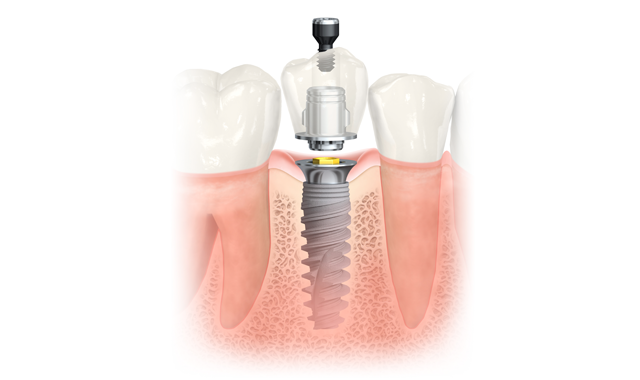So, how long do dental implants last?
90% of dental implants remain intact after 10 years!
Depending on your lifestyle and dental hygiene, dental implants can have the potential to last 25-30 years – that’s as long as a mortgage!
In fact, the implant component of a dental implant (titanium screw fixed into the jawbone) can last a lifetime with little maintenance, from daily brushing and flossing, to making visits to your dentist twice a year.
Meanwhile, the crown (a custom-made porcelain cap replacing the natural enamel of your tooth) can last 10-15 years with natural wear before replacement is needed.
Compared to other alternatives for dental implants:
Dental bridges – typically last an average of 5-7 years.
Dentures – dentists recommend new dentures after 5-8 years when bone loss causes the jaw to change shape.
Dental implants last much longer because they are usually made of strong materials such as titanium, which is less prone to corrosion, while being lightweight. The human body also does not reject titanium as a foreign object. Dental implants are not affected by adjoining teeth like dental bridges, and do not slip when chewing or biting unlike dentures.
Other factors affecting how long your dental implants last include your mouth location: implants in the back are likely to wear faster due to more strain in chewing. The strength and condition of your jawbone going forward also affects how long your implants will last.
What is a dental implant procedure like?
A dental implant procedure is a safe, generally 1-hour procedure completed in the dentist’s office with the care of experienced specialists. However, the implant is completed in stages over a few months due to the jawbone needing to be fused to the implant or ‘osseointegrated’:
Your dentist will undertake a scan or X-ray of your mouth to decide where to place the implant.
You will then be given anaesthetic as you undergo the implant operation. The dentist will drill the bone where the implant is to be fixed.
You must wait between 3-9 months to let the bone grow around the implant. Once the implant is stable and adequately osseointegrated, your dentist will create a foundation or ‘abutment’ for your new teeth, which is attached to the implant. The dentist takes a mould of your mouth to start constructing your artificial bridge or crown. The bridge or crown is screwed into the abutment, completing your implant.
How long is the recovery time for dental implants?
The typical recovery time for a dental implant is a few days(6-12 weeks). To allow for full completion it may take up to 2-6 months from the initial implant operation to your artificial teeth being anchored.
If you need bone or gum grafting surgery, it will take an even longer period of 8-12 months for the implant to be installed. This is a surgical procedure that replaces missing bone in order to fix damaged or diseased bones or joints.
Although it takes a while for the entire process to be completed, the healing for a single dental implant generally takes 1-2 days, which varies for individual cases. This means you can easily resume your daily life and activities while waiting for the bone fusion to finish for the next few weeks. You can make your recovery time faster and lessen pain by:
- not disturbing the surgical area of the implant
- gently rinsing with water 2-3 times a day after 24 hours of the operation
- softly brushing your teeth
- applying ice to the area if needed
- getting enough rest
- eating soft foods and avoiding acidic or spicy foods
How can I make my dental implants last longer?
There are many ways you can make your dental implants last longer beyond the average success rate of 10 years:
- Take proper care of your dental implants
- Maintain your oral health, including your gums to avoid gum (periodontal) disease, including brushing and flossing
- Avoid smoking
- Avoid sugary foods and drinks
- Keep your alcohol intake low
- Eat lots of fruits and vegetables
- Make regular check-ups to the dentist (at least every 6 months)
With dental implants being the most sought-after popular solution for missing teeth, it’s easy to see why patients prefer them over bridges and dentures. They’re durable and don’t cause pain or discomfort, won’t fall out, act as your natural teeth, prevent bone loss, don’t interfere with your speech or eating, and enhance your smile.

